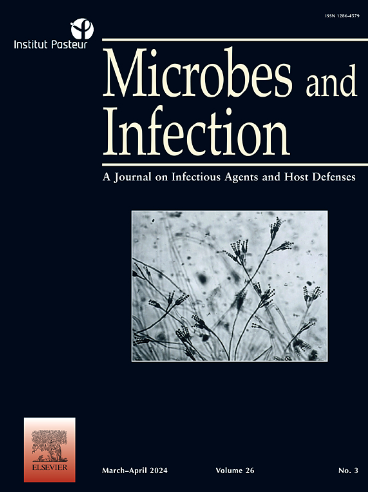C1q modulation of antibody-dependent enhancement of dengue virus infection in human myeloid cell lines is dependent on cell type and antibody specificity
IF 2.6
4区 医学
Q3 IMMUNOLOGY
引用次数: 0
Abstract
Antibody-dependent enhancement (ADE) of dengue virus (DENV) infection is one of the mechanisms contributing to increased severity during heterotypic, secondary infection. The complement protein C1q has been shown to reduce the magnitude of ADE in vitro. Therefore, we investigated the mechanisms of C1q modulation of ADE, focusing on processes of viral entry.
Using a model of ADE of DENV-1 infection in human myeloid cell lines in the presence of monoclonal antibodies, 4G2 and 2H2, we found that C1q produced nearly a 40-fold reduction of ADE of DENV-1 in K562 cells, but had no effect in U937 cells. In K562 cells, C1q reduced adsorption of DENV-1/4G2 and exerted a dual inhibitory effect on adsorption and internalization of DENV-1/2H2. Distinct endocytic pathways in the presence of antibody corresponded to conditions where C1q produced a differential action. Also, C1q did not affect the intrinsic cell response mediated by FcγR in human myeloid cells.
The modulation of ADE of DENV-1 by C1q is dependent on the FcγR expressed on immune cells and the specificity of the antibody comprising the immune complex. Understanding protective and pathogenic mechanisms in the humoral response to DENV infections is crucial for the successful design of antivirals and vaccines.
C1q 对抗体依赖性增强人类髓系细胞登革病毒感染的调节作用取决于细胞类型和抗体特异性。
登革病毒(DENV)感染的抗体依赖性增强(ADE)是导致异型继发感染严重程度增加的机制之一。体外研究表明,补体蛋白 C1q 可降低 ADE 的幅度。因此,我们研究了 C1q 调节 ADE 的机制,重点是病毒的进入过程。在单克隆抗体4G2和2H2存在的情况下,我们利用人类髓系细胞系中DENV-1感染的ADE模型发现,C1q能使K562细胞中DENV-1的ADE降低近40倍,但对U937细胞没有影响。在K562细胞中,C1q减少了DENV-1/4G2的吸附,并对DENV-1/2H2的吸附和内化产生了双重抑制作用。在抗体存在的情况下,不同的内吞途径对应于C1q产生不同作用的条件。此外,C1q 并不影响人类髓系细胞中由 FcγR 介导的内在细胞反应。C1q 对 DENV-1 ADE 的调节作用取决于免疫细胞上表达的 FcγR 和免疫复合物中抗体的特异性。了解对 DENV 感染的体液反应中的保护和致病机制对于成功设计抗病毒药物和疫苗至关重要。
本文章由计算机程序翻译,如有差异,请以英文原文为准。
求助全文
约1分钟内获得全文
求助全文
来源期刊

Microbes and Infection
医学-病毒学
CiteScore
12.60
自引率
1.70%
发文量
90
审稿时长
40 days
期刊介绍:
Microbes and Infection publishes 10 peer-reviewed issues per year in all fields of infection and immunity, covering the different levels of host-microbe interactions, and in particular:
the molecular biology and cell biology of the crosstalk between hosts (human and model organisms) and microbes (viruses, bacteria, parasites and fungi), including molecular virulence and evasion mechanisms.
the immune response to infection, including pathogenesis and host susceptibility.
emerging human infectious diseases.
systems immunology.
molecular epidemiology/genetics of host pathogen interactions.
microbiota and host "interactions".
vaccine development, including novel strategies and adjuvants.
Clinical studies, accounts of clinical trials and biomarker studies in infectious diseases are within the scope of the journal.
Microbes and Infection publishes articles on human pathogens or pathogens of model systems. However, articles on other microbes can be published if they contribute to our understanding of basic mechanisms of host-pathogen interactions. Purely descriptive and preliminary studies are discouraged.
 求助内容:
求助内容: 应助结果提醒方式:
应助结果提醒方式:


